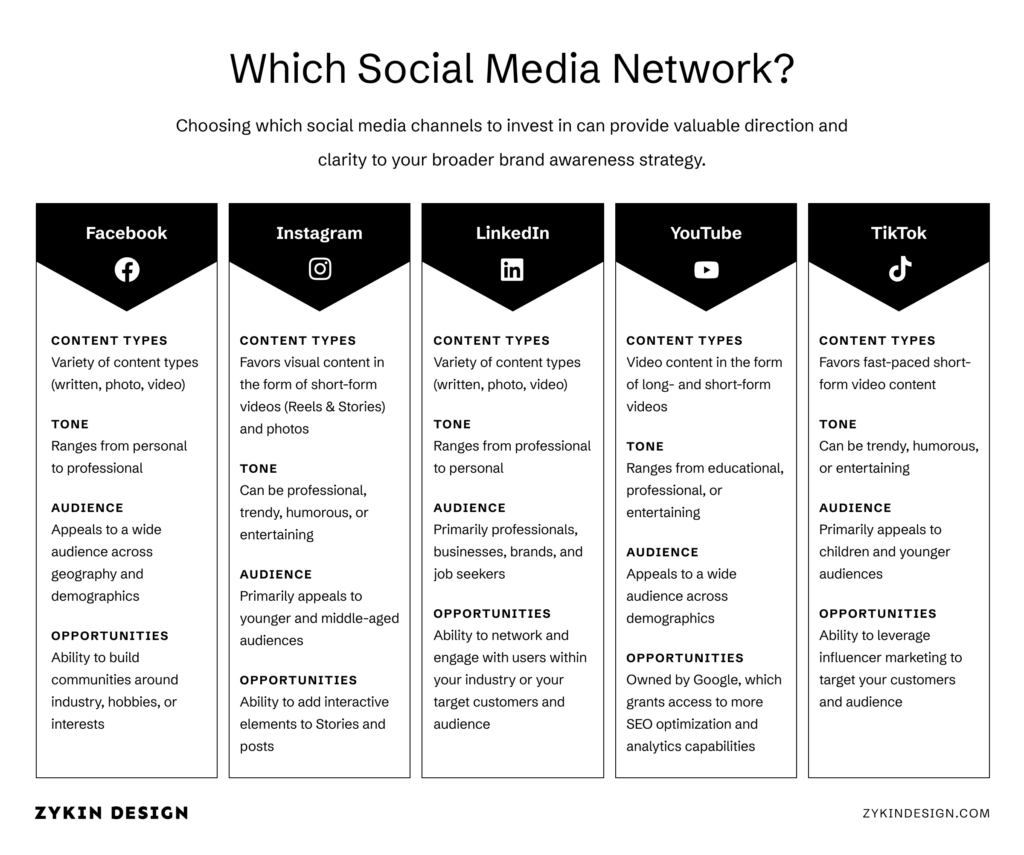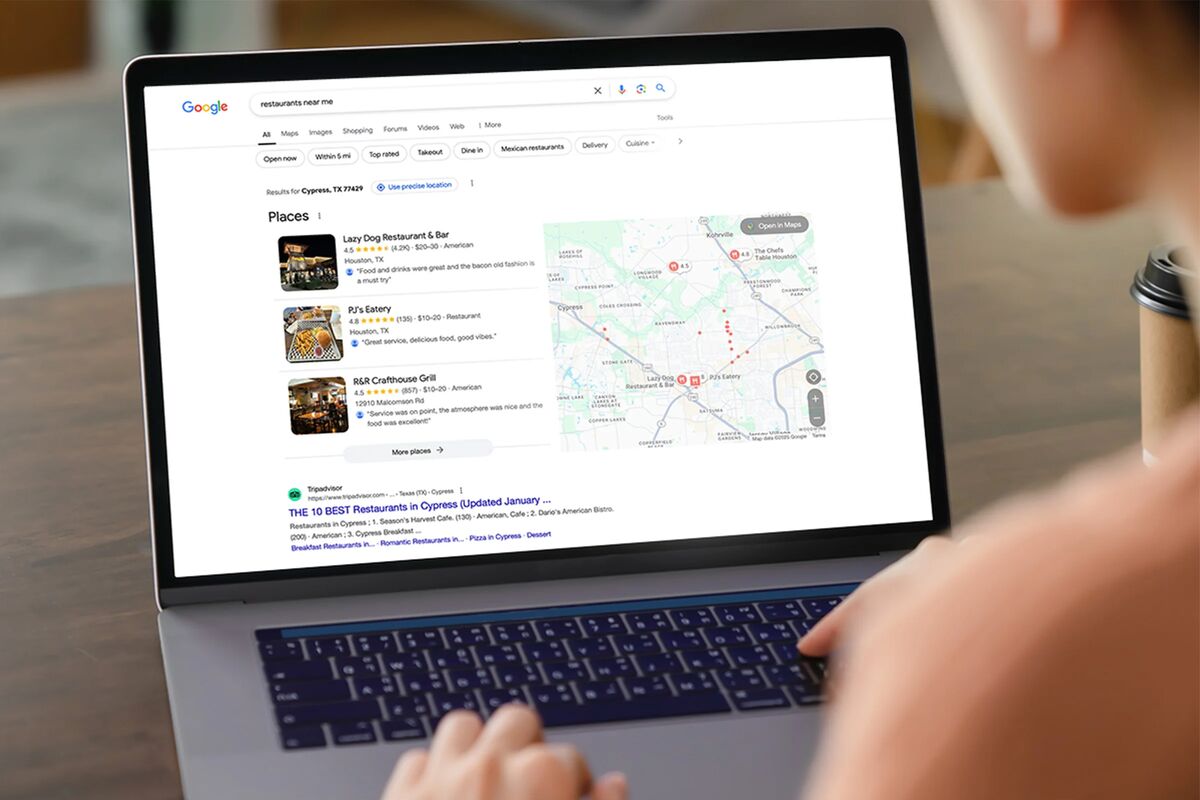Leveraging Social Media as Part of Your Marketing Strategy
By McKell Michaelson on November 1, 2024

Social media has become an integral part of our daily lives, influencing the way we communicate, consume information, and interact with brands. As a result, a wide range of social networks have emerged, each designed to serve different purposes and audiences. Whether you’re looking to highlight your services or company culture, connect with potential customers, or showcase your thought leadership around a topic, there’s probably a platform that aligns with your business goals. In this article, we’ll explore how to leverage each platform for a specific audience, the benefits to implementing a social media strategy, and how a marketing specialist can help you achieve your social media goals.
While social media is a key component of any marketing strategy, we will discuss the importance for B2B brands rather than B2C. Business to consumer social media strategies tend to focus on influencer collaborations and lifestyle and product showcases, whereas B2B focuses more on brand reinforcement, thought leadership, and networking.
Social Media Platforms: What Purpose Do They Serve?
As social media continues to evolve, a growing number of networks have emerged, each designed to serve distinct purposes. It’s important to select which social media platforms to target based on what makes sense in the context of your overarching marketing strategy.
- Facebook: Facebook allows users to post photos, videos, and stories, and share content from others, making it ideal for content diversity. A key feature for businesses (particularly local ones) is the ability to create community pages and groups where businesses can interact with their audience on a more personal level, building loyalty and trust. Facebook also provides businesses with the option to directly message customers, offering a personalized customer service experience.
- Youtube: YouTube accommodates a wide range of content formats, making it ideal for both short-form and long-form content. YouTube Shorts, which are brief, attention-grabbing videos under one minute, mirror the growing trend of short-form content consumption. However, YouTube’s real strength lies in its ability to showcase longer, in-depth videos. Businesses can utilize this format to demonstrate their expertise, provide detailed product demonstrations, or even host Q&A sessions to engage with their audience directly. Beyond its content flexibility, YouTube is also a powerful search engine, meaning that well-optimized videos can significantly boost a business’s visibility. With a variety of advertising options, businesses can reach a vast and diverse audience while fine-tuning their advertising strategy based on robust analytics.
- Instagram: Initially known for its square photo posts, Instagram has evolved into a platform that places significant emphasis on short-form video content like Reels and Stories. These video formats are excellent for brands looking to share behind-the-scenes content, product tutorials, or creative, attention-grabbing snippets that align with current trends.
- LinkedIn: LinkedIn is the go-to platform for professionals, making it an invaluable space for businesses focused on B2B marketing, recruiting, and networking. Most users are on LinkedIn for career-related reasons, such as job seeking or professional development, which makes it a great platform for positioning a company as an industry leader. Through thought leadership content, such as articles, posts, and videos that share expert insights or industry news, businesses can engage with potential employees, partners, or clients while demonstrating their authority. LinkedIn also provides tools for targeted advertising, allowing businesses to reach professionals by industry, job title, or even company size, making it especially effective for B2B marketing and talent acquisition.
- TikTok: TikTok’s short-form video platform is ideal for creative content and viral trends. It provides businesses with the opportunity to engage users through demos, explainer videos, and behind-the-scenes content. Influencer marketing on TikTok is incredibly powerful, with businesses partnering with influencers to showcase products or services to their audiences.
While this isn’t a comprehensive list of every social media network available, it gives you a good idea of the versatility of social media for business purposes. By no means is this article meant to encourage you to start posting on every social media platform. A marketing specialist will be able to help you determine which networks make the most sense for your business to leverage, based on thorough audience and brand research.
5 Reasons Why Leveraging Social Media is an Essential Part of a Marketing Strategy
With more and more businesses leveraging social media, it’s vital to stay ahead of the curve and not fall behind in a competitive market. The impact of social media on your business can be profound, offering opportunities to reach wider audiences, build stronger relationships, and increase brand awareness. Whether you’re a small business just starting out or an established company looking to expand, a well-executed social media marketing strategy can make all the difference. From increasing brand visibility to enhancing customer engagement, the benefits are substantial.
- Building Brand Awareness: Social media marketing allows your brand to be seen by far more people than traditional marketing methods. Consistent posting keeps your content visible, current, and reinforces your brand’s voice. Users can share your content with others, exponentially increasing your exposure, which comes at no additional cost to you. Incorporating visually engaging content, especially with your branded merchandise or equipment, further strengthens brand recognition. Posting on-brand, authentic content is key to being successful with social media.
- Network & Relationship Building: Social media enables you to target specific demographics, locations, and interests, helping you build relationships with customers who are most likely to be interested in your product or service. The interactive nature of social media facilitates two-way communication, allowing you to connect personally with your audience by responding to direct messages and comments, and demonstrating your commitment to customer service. Through social media, you can build a community of engaged followers who advocate for your brand, share your content, and recommend your business to others.
- Flexibility: Social media allows you to choose the platforms that best suit your content and tailor your posts accordingly. Whether you are posting photos, videos, or text, you can consistently provide your audience with engaging or high-value content. Social media also offers the flexibility to introduce new content as soon as it’s available, without needing to update your website. This opens up opportunities for continuous storytelling, where you can share your company’s journey, mission, values, and behind-the-scenes moments, humanizing your brand and creating a more personal connection with your audience.
- Brand Reinforcement: Social media isn’t just a tool for customer engagement; it’s also vital for employee interaction. A positive online presence reinforced by employee success stories or testimonials can help attract and retain top quality employees. Job seekers often review a company’s social media profiles to gauge its culture and values, which can be pivotal in their decision-making process. Additionally, social media platforms provide an avenue for establishing thought leadership by sharing industry insights, ideas, and successes, positioning your brand as an expert in your industry.
- SEO Opportunities: SEO extends beyond your website—off-site efforts like social media are just as important. Social media management tools provide analytics that allow you to make data-driven decisions on content, audience targeting, and identifying new markets. These tools typically allow you to optimize your strategy through A/B testing and refine your approach based on what resonates most with your audience. A data-driven strategy can enhance your overall SEO performance, making your content as engaging and effective as possible.
Key Takeaways
Incorporating a well-crafted social media strategy into your marketing plan is not just a trend—it’s a necessity in today’s digital world. By embracing the power of social media, you can significantly boost your brand awareness, foster meaningful relationships with your customers and potential employees, and enhance your overall content library. Leveraging social media for employee engagement and thought leadership can strengthen your company’s reputation and attract top talent. The SEO benefits of social media cannot be overlooked either, as they allow you to take a data-driven approach to improving your online presence. In a competitive market, these advantages can set your business apart and drive long-term success.
A marketing specialist can play a crucial role in developing your business’s social media strategy. By helping you identify your target audience, understand where they spend their time, and determine what content resonates with them, a marketing specialist can help you get started with an informed approach.They can also track and analyze data from multiple platforms using social media management tools, allowing you to adjust your content strategy as needed.
While implementing a social media strategy into your marketing efforts can seem intimidating, we are here to help guide you through. Contact us to discover how social media can take your business to the next level.

About the Author
McKell Michaelson is a Digital Marketing Specialist at Zykin Design dedicated to driving business growth, maximizing ROI, and increasing brand visibility through strategic and thorough online marketing campaigns.


